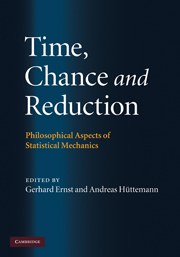Book contents
5 - The natural-range conception of probability
from Part II - Probability and chance
Published online by Cambridge University Press: 04 August 2010
Summary
Objective interpretations of probability
Objective interpretations claim that probability statements are made true or false by physical reality, and not by our state of mind or information. The task is to provide truth conditions for probability statements that are objective in this sense. Usually, two varieties of such interpretations are distinguished and discussed: frequency interpretations and propensity interpretations. Both face considerable problems, the most serious of which I will briefly recall to motivate the search for an alternative.
Firstly, the frequency interpretations. Here the central problem is that it is very implausible (to say the least) to postulate a non-probabilistic connection between probabilities and relative frequencies. What a frequency approach claims seems either to be false or to presuppose the notion of probability. Take, for example, the repeated throwing of a fair die that has equal probabilities for each side. All you can say is that it is very probable that upon many repetitions each face will turn up with a relative frequency of approximately 1/6 (weak law of large numbers). Or that, with probability 1, the limiting relative frequency of each face would be 1/6 in an infinite number of repetitions (strong law of large numbers). You cannot drop the clauses ‘very probable’ or ‘with probability 1’ in these statements. There are no relative frequencies that the die would produce on repeated throwing, but it could, with varying probabilities, yield any frequency of a given outcome.
- Type
- Chapter
- Information
- Time, Chance, and ReductionPhilosophical Aspects of Statistical Mechanics, pp. 71 - 91Publisher: Cambridge University PressPrint publication year: 2010
References
- 22
- Cited by



